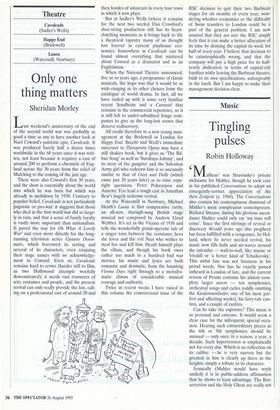Theatre
Cavalcade (Sadler's Wells)
Happy End (Bridewell) Laura (Watermill, Newbury)
Only one thing matters
Sheridan Morley
Last weekend's anniversary of the end of the second world war was probably as good a time as any to have another look at Noel Coward's patriotic epic, Cavalcade. It was produced barely half a dozen times worldwide in the 60 years since it was writ- ten, not least because it requires a cast of around 200 to perform a chronicle of Eng- land across the 30 years from the relief of Mafeking to the coming of the jazz age.
These were also Coward's first 30 years, and the show is essentially about the world into which he was born but which was already in meltdown by 1930. Contrary to popular belief, Cavalcade is not particularly jingoistic or pro-war: it suggests that those who died in the first world war did so large- ly in vain, and that a sense of family loyalty is vastly more important than nationalism. It paved the way for Oh What A Lovely War! and even more directly for the long- running television series Upstairs Down- stairs, which borrowed its setting and several of its characters, even retaining their stage names with no acknowledge- ment to Coward. Even so, Cavalcade remains hard to revive (harder still to film, as two Hollywood attempts woefully demonstrated); it needs vast resources of sets, costumes and people, and the present revival can only really provide the last, call- ing on a professional cast of around 20 and then hordes of amateurs in every tour town in which it now plays.
But at Sadler's Wells (where it remains for the next two weeks) Dan Crawford's shoe-string production still has its heart- clutching moments as it brings back to life a theatrical tapestry many of us thought lost forever in current playhouse eco- nomics. Somewhere in Cavalcade can be found almost everything that mattered about Coward as a dramatist and as an Englishman.
When the National Theatre announced, five or so years ago, a programme of classic musicals, the hope was that it would be as wide-ranging as its other choices from the catalogue of world drama. In fact, all we have ended up with is some very familiar recent Sondheim and a Carousel that remains in the commercial repertoire, so it is still left to under-subsidised fringe com- panies to give us the long-lost scores that deserve rediscovery.
All credit therefore to a new young man- agement at the Bridewell in London for Happy End. Brecht and Weill's immediate successor to Threepenny Opera may have a still shakier book, but it gives us 'The Bil- bao Song' as well as 'Surabaya Johnny', and its story of the gangster and the Salvation Army girl who redeems him is so uncannily similar to that of Guys and Dolls (which came just 20 years later) as to raise copy- right questions. Peter Polycarpou and Annette Yeo lead a tough cast in Jonathan Best's hugely welcome revival.
At the Watermill in Newbury, Michael Heath's Laura is that comparative rarity, an all-new, through-sung British stage musical not composed by Andrew Lloyd Webber. It's set in the Vienna of 1938 and tells the wonderfully grand-operatic tale of a singer torn between the resistance hero she loves and the evil Nazi who wishes to steal her and kill him. Heath himself plays the villain, and though his book owes rather too much to a hundred bad war movies, his music and lyrics are both romantic and dramatic, from the haunting Vienna Days right through to a melodra- matic climax of considerable musical courage and authority.
Twice in recent weeks I have raised in this column the controversial issue of the RSC decision to quit their two Barbican stages for six months of every year, won- dering whether economics or the difficulty of Swan transfers to London could be a part of the general problem. I am now assured that they are not: the RSC simply feels that it can make a better allocation of its time by denying the capital its work for half of every year. I believe that decision to be catastrophically wrong, and that the company will pay a high price for its half- yearly abdication in terms of capital-city loyalties while leaving the Barbican theatre, built to its own specifications, unforgivably in the lurch. But I am happy to make their management decision clear.


















































 Previous page
Previous page